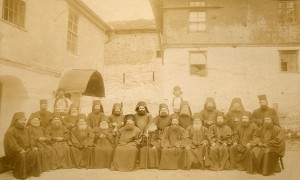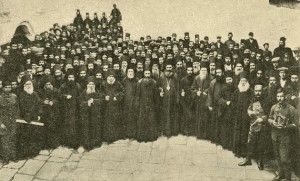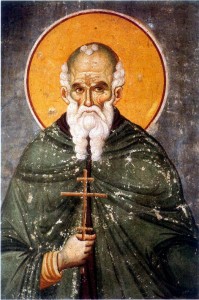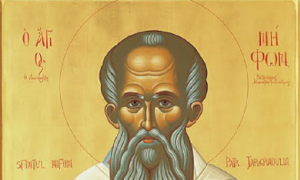Blessed Elder Paisios talks about monasticism
7 November 2011– Geronta, do all the monks understand the meaning of what it means to be a monk?
– Monasticism is a great honor and blessing which the Lord has given to man. It is only very slowly that the monk comprehends its deeper meaning. This makes him feel a real delight. He does not stop giving praise and thanks to the Lord. He feels the great honor which has been done to him. It is a little difficult for someone to appreciate the greatness of this calling. The monks live the life of the angels’ right from this life that’s why they are called the ‘Angelic order’. The monk embarks on tasting some of the pleasures of the Heavens only after long trials and the buildup of spiritual fruit. He feels grateful to the Lord to the end of his days through humility, repentance and God’s grace,
– Geronta, parents usually oppose their child’s wish to become a monk.
– This is how it is in the beginning. Very slowly parents start to get the meaning. They appreciate the magnitude of the honor that the Lord has given them. They become in laws with the creator of the Universe! Their child, who has devoted himself to the Lord, helps to save not only his parents’ souls, but also the souls of his entire village. In Asia Minor, it was regarded as a huge blessing if a family had a member who was a monk. He would be interceding for the souls of all his relatives.
– Geronta, what is the monk’s main duty?
– The monk begins with loving God. He, who loves the Lord, loves also his neighbor. The monk lives his whole life hurting. He is in pain, wanting to save his soul. This is so, because of his great adoration towards the Lord, because of his divine love. He is also hurting, wanting to save the whole world. This is due to his love for his neighbor.
– Geronta, why does the monk renounce the world?
– He renounces the world because he loves the world. He does not hate the world. He does not renounce the world because he is arrogant and wants only to save his own soul. It is because he loves the world that he stays away from the world’s parasites in order to attain a better communication with the Lord.
– Geronta, usually the monks do not preach. But sometimes we encounter pious monks who go on a mission. What is happening in such cases?
– The monks preach in their own way. They are like beacons on high rock, which illuminate the surrounds and direct the ships to their right destination. Monks help each and every person towards his true destination who is the Lord. The monk preaches the gospel with his own life. He lives the gospel, and God’s grace gives him away. Thus, the gospel is preached in the most positive way, which is something people are looking for nowadays.
– Geronta, what do you have to say about missionary monks?
– The Lord is carrying out His plan on them. The monk does not make plans neither does he have designs to go on a mission. The Good Lord makes him carry out His plan, as if it was his. When the Lord decides that someone must be sent on a mission, He sends Him Himself in His own divine way.
– Geronta, do all the monks acquire virtues?
– A monk does not think about virtues. The monk obeys the Lord’s commands. He gives everything to Christ. He hands over himself to Christ. He feels like he is God’s child. And as the child of God he has a right to his father’s property. The Good Lord hands out abundant blessings to his creatures if it is not going to be to their detriment.
– Geronta, what should the monk watch out for?
– The monk must imitate Christ because he loves Him. He is the bridegroom of his soul. He must imitate Him, in His total obedience. It is because of His enormous love that Christ descended from Heaven, was born in a cradle, obeyed our Lady and Joseph and has shown obedience until His death, a death on the Cross. Obedience means humility. The monk should obey not only older people but also those that are younger than him. The monk must cultivate devoutness. He seeks anonymity and abhorrence. He seeks the Lord and our Lady if he desires love and affection and not other people. He detests arrogance and constantly tries to increase his love towards the Lord and his neighbor. Because he lives spiritually, he feeds on the Lord’s love and nourishes other people with it.
– Geronta, give me your blessing.
– May you have the Lord’s blessing. May Paradise devour you!












